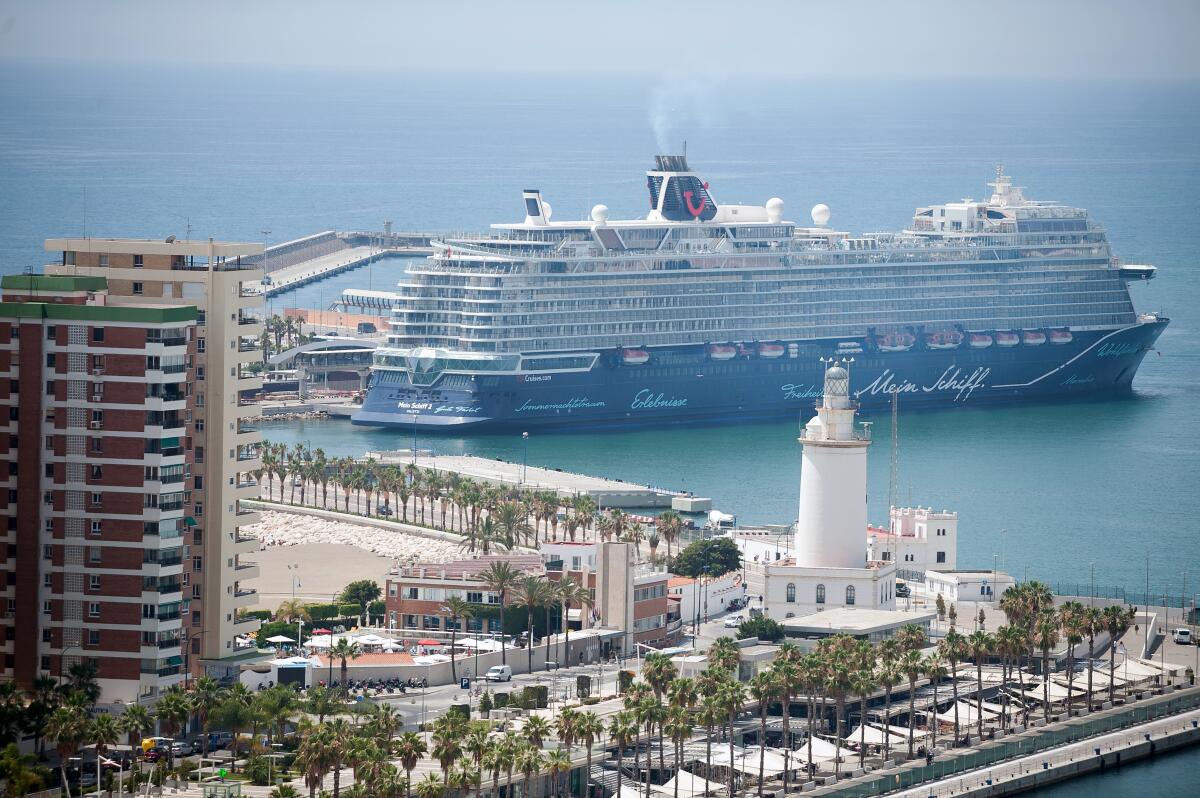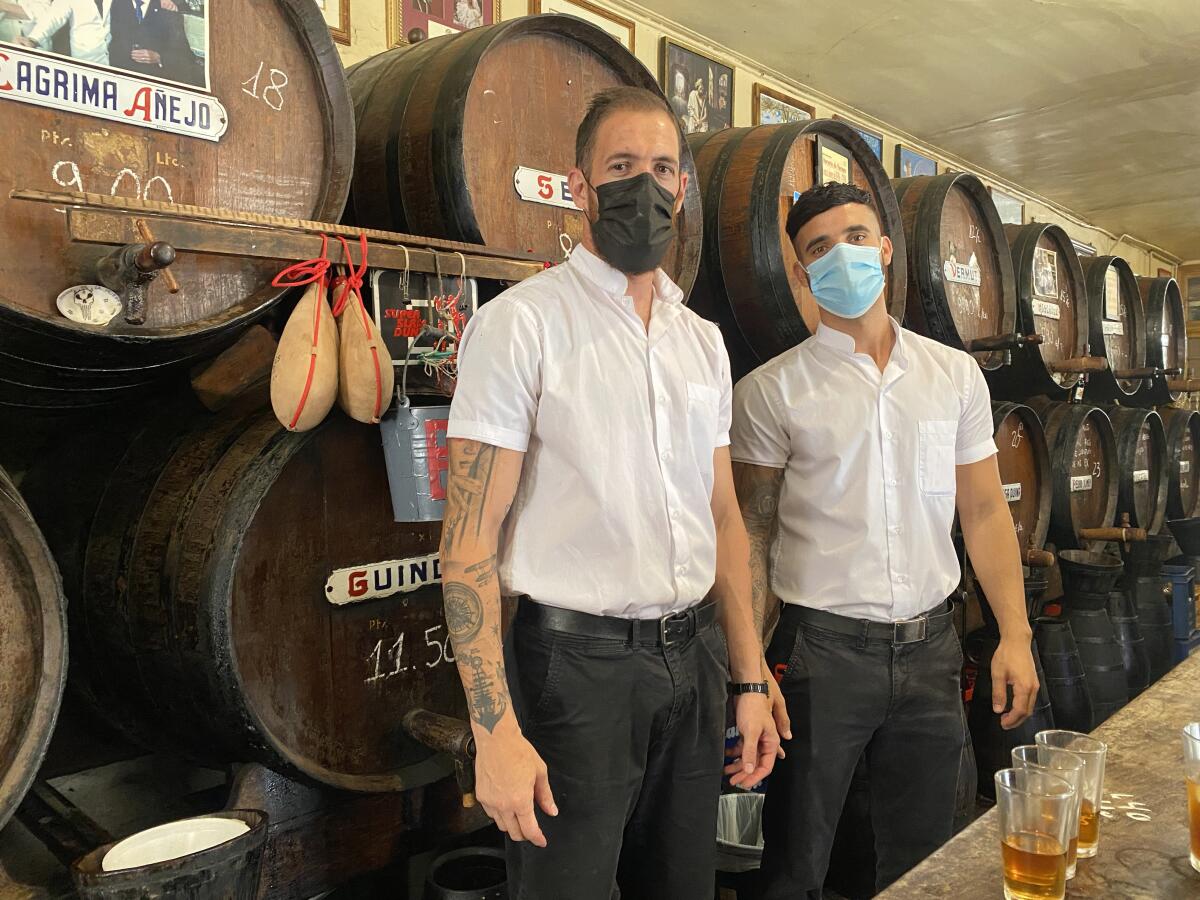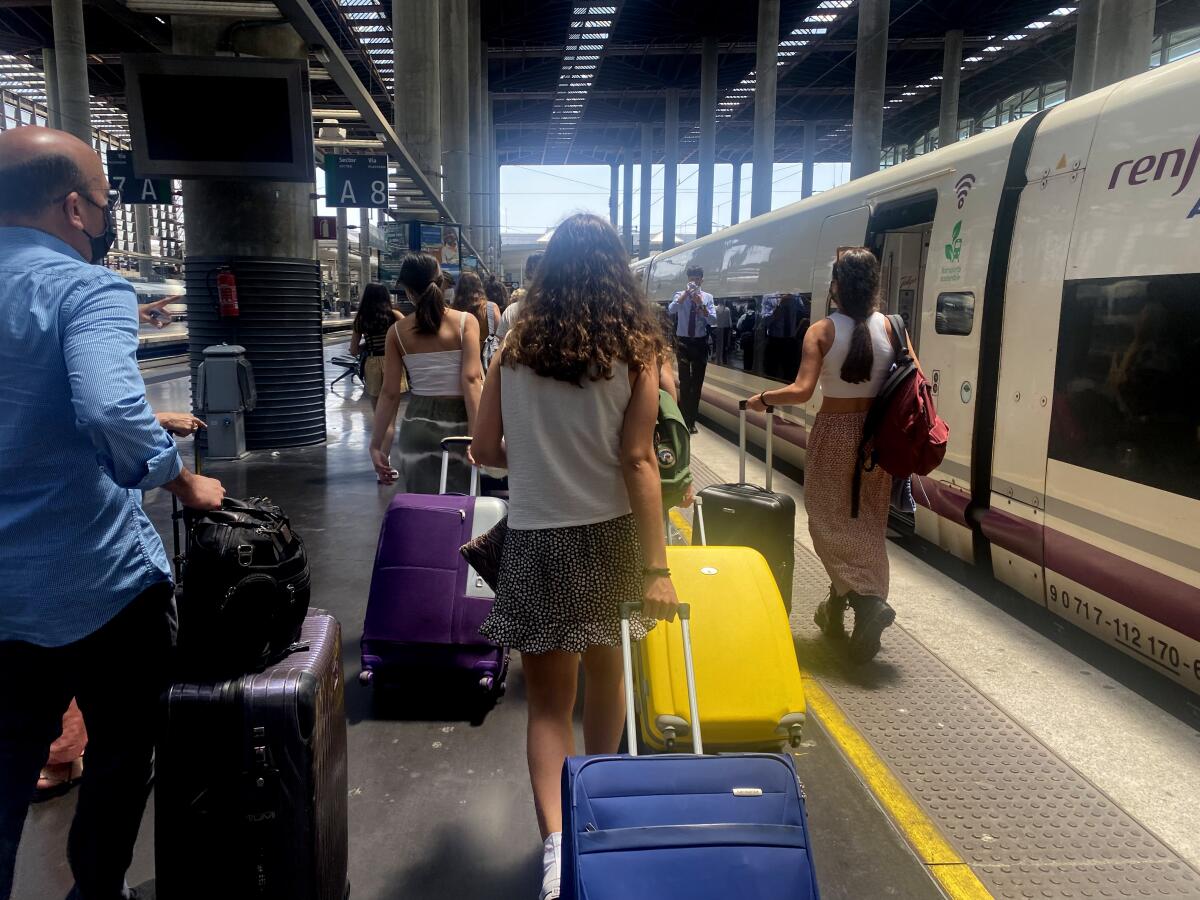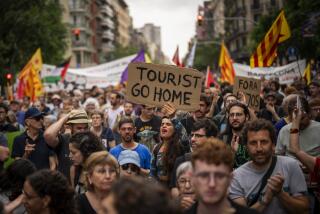Europe opens to American tourists: Spain’s (cruise) ship finally comes in

- Share via
MALAGA, Spain — On a warm morning this week, Florencia Frangi was barely awake when she saw her phone light up with messages: The first cruise ship to dock in mainland Spain in more than a year had sailed into Malaga’s port. She wept with relief.
Frangi wasn’t alone. In tourism-dependent Spanish cities like this historic hub on the country’s Mediterranean Costa del Sol, the streets are again filling with the summertime scents of churros, chocolate and fried fish, now mingled with the buzz of foreign languages.
Across Europe, the long-awaited reopening to tourism is proceeding in piecemeal fashion but at a quickening pace. On Friday, the European Union took a major step forward by formally recommending that its 27 member states lift a ban on nonessential travel from the United States, opening the way to salvaging the summer tourist trade.
Under the EU’s new nonbinding measures, it is up to individual countries to decide on visitor regulations, and Germany quickly said it would allow Americans to enter if they are vaccinated or test negative for the coronavirus. Southern European nations like Spain are in the forefront in advocating maximum mobility, despite risks of reigniting the coronavirus contagion and quarrels over what kind of vaccine certification should be adopted.

In Malaga, Frangi, a young mother who emigrated from Argentina five years ago, had grown desperate as the pandemic raged and her adopted city shut down. Before the virus hit, she managed to support herself and her 4-year-old daughter by selling a few dozen 10-euro souvenir paper fans a day outside the city’s landmark Renaissance-style cathedral.
In a recent grim stretch, though, she sold only one fan — which she and her partner hand-decorate with iconic images from Malaga-born artist Pablo Picasso — in an entire week. When the family was down to little more than pasta in the cupboard, Frangi, with enormous reluctance, had to ask her parents in Argentina for help.
As Europe opens its doors, hosts and visitors alike must cope with a patchwork of rules. For Spain, Britain is usually the main source of tourists, but the country is still blacklisted by the United Kingdom. Germans, though, have been given the go-ahead to travel to Spain and other EU countries — which accounted for the arrival Tuesday of the vessel Mein Schiff 2, operated by the German-based tourism giant TUI.
When the ship docked soon after dawn, word swept quickly through Malaga, a city of a little over half a million people, via radio and TV reports, on Instagram and in texts, by excited word of mouth.
Frangi wasted no time. She spread her display of ornamental fans on the ground on Santa Maria Street, in the cathedral’s shadow, selling five in less than an hour.
But amid rejoicing, there is risk. Particularly with new virus variants in circulation, the reopening carries infection hazards, especially for young Spaniards working in the hospitality and tourism sector.

A few yards from the cathedral, at a 19th century bar that claims to be the city’s oldest, waiter David Zayas hustled enthusiastically back and forth, serving wine and beer to throngs of German cruise-ship passengers.
“Seeing tourists gives us hope,” he said. But he acknowledged that other than the bar owner, none of the staff had yet been vaccinated because shots for people in his age group — from his age, 30, up to 39 — had just begun.
Some tourism workers were fatalistic. “Social distance, masks and prayers to the Virgin that we don’t get infected, that’s all we have,” said Cándida Gómez Pérez, 33, the co-owner of a tourism company.
The president of the port authority of Malaga, Carlos Rubio, speaking on public radio, lamented “15 months of emptiness on our docks, 15 months of waiting.” Pre-pandemic, in 2019, Spain welcomed more than 80 million tourists, and the cruise industry alone contributed more than $3.4 billion to Spain’s GDP, according to the Cruise Lines International Assn.
Spain was among the world’s hardest-hit countries in the pandemic, with more than 80,000 deaths and 3.7 million infections. Although cases have dropped off in recent weeks, only 27% of the country’s population is fully immunized.

COVID-19 also worsened an already dark jobs picture in Spain, which leads the EU in youth unemployment. One in four young people in Spain became unemployed during 2020, and almost 40% are still jobless.
Elsewhere in Europe, some people remain more comfortable staying close to home, even as restrictions loosen.
About half of Germany’s population is now at least partially inoculated, and cafes, restaurants, hotels and movie theaters have been gradually reopening. Germans can travel elsewhere in Europe if they wish, but many prefer domestic getaways like Sylt, Germany’s largest North Sea island.
“Overnight, we were booked out for the whole summer,” said Simone Carmen Tenta, the interim manager of a classic hotel on the island that dates back to the 1890s.
In pushing for more tourist mobility, Spain is advocating for a universal framework such as vaccine certificates, already in the working stages in various parts of Europe. But there’s recognition of the subject’s sensitivity, particularly for Americans.
“We do not call it a passport, because the passport seems to give or take away rights,” said Manuel Muñiz, a senior official in the Ministry of Foreign Affairs. He described certification as meant to complement testing requirements.
Among the recent arrivals in Malaga was Patricia Espinoza, a Spanish teacher from North Carolina who had a group of students in tow. She said her compatriots were tired of not being able to travel, especially to Europe, long the favored U.S. tourism destination.
“We Americans are ready,” she said.
Special correspondent Erik Kirschbaum in Berlin and Times staff writer Laura King in Washington contributed to this report.
More to Read
Sign up for Essential California
The most important California stories and recommendations in your inbox every morning.
You may occasionally receive promotional content from the Los Angeles Times.













